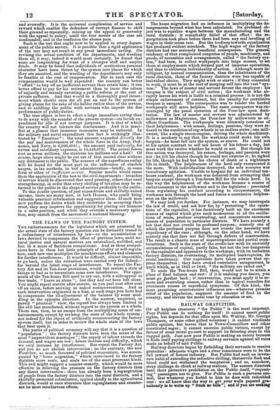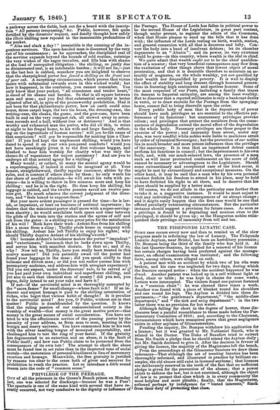RAILWAY GRATUITIES.
OF all helpless creatures "the Public" is the most impotent. Poor Public can do nothing for itself: it cannot assert public rights, but depends for that office upon Mr. Wakley, Mr. George Thompson, or some other gifted volunteer ; it cannot vindicate public opinion, but leaves that to Town-Councillors and other constituted sages ; it cannot exercise public virtues, except by favour of some moral go-cart to support its faltering steps in the rugged path. Just now poor Public is making an outcry because it finds itself paying shillings to railway servants against all rules made on behalf of said Public.
Railway directors began by forbidding their servants to receive gratuities : adequate wages and a clear conscience were to be the full reward of honest industry. But Public had such an invete- rate habit of extruding the seductive shilling, that servile flesh and blood could not withstand the temptation ; and so, somehow, stray shillings do chink at railway stations. The austere directors .bent their protective prohibition on the Public itself, "request- ing" passengers not to give. For Public is such a perverse ani- mal, that whatever you forbid to him he does with redoubled zest : we all know that the way to get your walls papered gra- tuitously is to write up " Stick no bills"; and if you are seeking a pathway across the fields, look out for a board with the inscrip- tion "All persons trespassing," &c. Public, however, felt quite
fortified by the directors' request, and fondly thought how safely the illicit shilling now reposed in the inaccessible profundities of the pocket. "Alas and alack a day ! " irresistible is the cunning of the in- genious servitors. The open-handed man is discerned by the very cut of his countenance ; as he approaches, the disciplined zeal of the servitor expands beyond the bounds of cold routine, outstrips the very wishes of the eager traveller, and fills him with shame at the load of unrequited obligation : the shilling, so justly due to disinterested zeal, is an intolerable burden ; it will not lie,—just as the last box is cabbed, somehow you are delighted to observe that the sharpsighted porter has found a shilling on the front seat of your cab. A surprising circumstance, which proves that virtue meets with substantial rewards even in this wicked world ; but how it happened, in the confusion, you cannot remember. You only know that your pocket, " all conscience and tender heart," is eased of its shame and burden. So that is all square between man and man ; and you feel that substantial morality is better adjusted after all, in spite of the praiseworthy prohibition. Had it not been for that philanthropic porter, how on earth could nine boxes, three carpet bags, the two tin boxes, the dressing-case, the
writing-case, the cloaks, the game, and the gun-case, -have been built in and on the very compact cab, all stowed away in seven-
teen seconds and a half, without loss or detriment ? And is that worthy and exhausted man the porter, who did all this, to retire at night to his frugal home, to his wife and large family, reflect- ing on the ingratitude of human nature ? will you be the cause of that scepticism ? will you be responsible for making him a Char- tist? If you had kept the unpleasant shilling, would you have dared to spend it on your own pampered comforts ? would you not have sneakingly given it to the first welcome beggar, and blushed to hear him worship for charity what was only the shame-fit of repentance for unjust parsimony ? And are you to undergo all that mental agony for a shilling ? Many would ; or rather, to many the mental agony would be a supererogation, if indeed it could be imagined at all. Your honest, straightforward, thrifty regular customer, abides by the rules, and is content if others abide by them ; he only wants his due share of needful attention—he will await his turn with pa- tience—he is willing to throw in five minutes more and keep his shilling: and he is in the right. He does keep his shilling, his luggage is cabbed, and the twelve pennies saved are twelve pen- nies got. He much admires the correct judgment of the direc- tors, and "feels bound to support them."
But your more ardent passenger is pressed for time—he is lav- ish, or impatient, or bent on business of national importance ; he desires that the ministrant porter shall move with a super-serving- man alacrity ; he would annihilate both space and time between the glide of the train into the station and the egress of self and cab from the gates : is a shilling too great price for the satisfaction of his will ? Both have their wish : Ardent flies from his shilling like a atone from a sling ; Thrifty plods home in company with his shilling. Ardent has left Thrifty to enjoy his rights; why should Thrifty deprive Ardent of his shilling'sworth? Oh! because Ardent's lavishness makes the porter " impudent " and "extortionate," insomuch that he looks down upon Thrifty, and serves him with manifest disdain. Is that so ; and if so, why ? Now tell us, Thrifty, have you really been treated in this scurvy manner ? Did you patiently await till the porter had found your luggage in the mass ; did you speak civilly to that toilsome and driven man ; or did you not rather pursue him with peremptory acclaims, and address him with arrogant expectancy ?
Did you not expect, under the directors' rule, to be served as if you had paid your own individual and superfluent shilling, and yet also to save that identical sum of money ? did you not, you rogue, fully intend to eat your cake and have it ? If not—if the servitorial mind is so thoroughly corrupted by the "sacra fames" for small change—whose fault is it? If an in- decent and unjust homage is paid to the shilling ostentation of riches, who begot that vicious habit of thought ? Is it peculiar to the servitorial mind? Are you, 0 Public, without sin in that matter ? Public is dumbfounded by the question. It knows that the ruling passion of our commercialized society is the worship of wealth—that money is the great motive power—that money is the great means of social consideration. You have not tried to win the affectionate service of the passing porter by the amenity of your address, as from man to man, meeting in this benign and starry universe. You have summoned him to his task with the silver snarling tongue of moneyed respectability, and challenged him to test the ring of your metal. If the gratuity has degenerated to an extortion and an abuse, it is the fault of Public itself; and how can Public claim to be protected from the consequences of its own tort ? The attempt to check the abuse must be found less in set rules than in the improved tone of social morals—the restoration of personal kindliness in lieu of mercenary exaction and homage. Meanwhile, the free gratuity is justified by reasons too clear to the sense both of giver and receiver for prohibition to reach the practice. Let us introduce a little sound reason into the code of "common sense."































 Previous page
Previous page